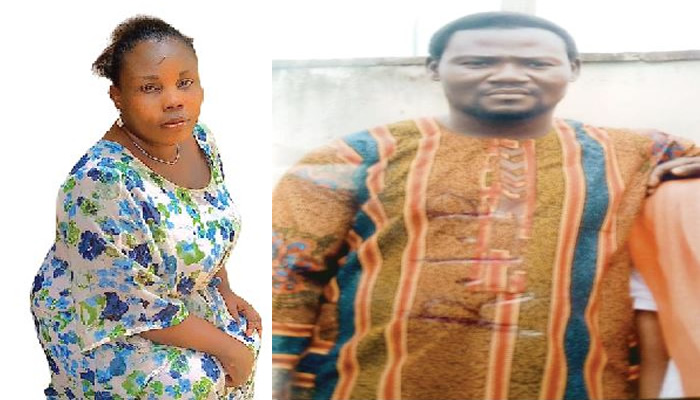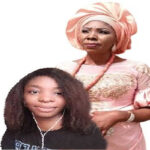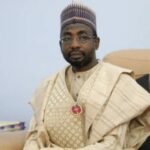
Oluwatomisin Sulaimon, the wife of a Lagos furniture maker, Taofeeq, narrates to EMMANUEL OJO the events that led to the death of her husband
You have had many challenging days so far. Can you give an account of your early life and how it all started?
My name is Oluwatomisin Sulaimon. I am from Ondo State. I lost my dad when I was very young. I was a baby when he died. After his demise, we left the village and moved to Ibadan. My mum was a trader; she went to other towns to buy things and she brought them to Ibadan to sell. We built a house at Apete in Ibadan. After my dad died, I was taken for immunisation but the vaccination didn’t go well and that was what led to the issue with my leg. I was taken here and there to find a solution to the issue the injection caused on my leg. I was eventually taken to University College Hospital, Ibadan, where I spent some years but God took control.
When I was 15 years old, I was told to move to Lagos to stay with my elder brother. I am someone that is very hardworking and can take up any job but they (my guardian) said I can’t just do any work because of the physical challenge I had with my leg.
I came to Lagos around 2003 and that was about the time the Gbenga Adeboye died. I came to Lagos a month before Gbenga Adeboye died. I was asked not to learn any vocation because of the condition of my leg. My guardians told me that I would only cope if I had a business. Meanwhile, before I left Ibadan, I used to go to a place called Agbeni, where they sold provision items and things at wholesale prices. I spent a little time there before coming to Lagos.
How did you meet your husband?
Eventually, I discovered that there was a woman close to us that was into hairdressing and had a salon. So, I usually went to her shop during working hours, and after work, I went back home and that was how I was able to learn a bit. So, I later thought of what to do to maximise my time, instead of sitting and wasting the whole day, I went to apply at a salon in Ojodu-Berger, Lagos. When I applied, I was hired for some years and that was where my husband and I met.
What year was that?
That was in 2008/2009.
When did you get married?
We spent about three years courting. When it was April 2010, we decided to get married. We did an introduction with both families and he carried out his traditional obligations; he paid all that was required of him and from there on, I moved in with him and started the family life.
Can you narrate the events that led to the death of your husband?
The accident took place on June 24, 2023. He usually didn’t stay long outside; he liked coming in on time. Even if there was a football match that he wanted to go and watch, he would inform me of it and would give an estimation of the time he would get back home, and at such times, the children would prefer to stay awake and watch cartoon till their dad arrived.
On that Saturday night, there was a programme we were supposed to have in the church. Although he was a Muslim, he gave me the liberty to practise Christianity and to go to church. So, we had a programme and I already planned that we would leave the house at 7:30 pm. So, I was actually preparing to leave the house and was attending to my little child when I got a call.
When the call came in, I picked up and said, ‘Hello, my husband, where are you now?’ but someone else responded from the other end of the call and said, ‘This is not your husband; he had an accident and he is in Oremeji in Akute area’. I was shocked and thought of how that came about. I was told it was an accident and that I should be on my way immediately. Before I got to the wardrobe to get something to wear, another call had come and at that point, it occurred to me that it must be a serious matter.
I thought of it that if it were mere injury on him, he would still have been able to speak with me on the phone and could have explained things better to my understanding, but it was rather random individuals that spoke with his phone. I grabbed some clothes to wear and our neighbour, who is a bit of age, came along with me when we got there, the okada (commercial motorcycle) we took dropped us a bit close to the point where the accident took place. I sighted someone lying on the floor and I said to the woman (our neighbour) that came with me that, that was my husband right there but she said it wasn’t him but I insisted that I knew my husband very well and could identify him from anywhere.
On getting to the accident point, people were just gathered and watching, nobody made any move to give any form of help and he was actually the one. I raised his head and called him, telling him I am his wife and that he should talk to me, I hugged him and drew him to myself but there was no response from him. People were still gathered and all they did was watch. I pleaded that they should come to my aid and help me to carry him to a nearby hospital. We later got an okada rider that offered to help.
At that point, my husband’s body was flabby; he couldn’t sit on the motorcycle. That was how they managed to take him to the hospital close to Oremeji in Akute. When we got there, they refused to grant us access to the place and we were told to take him to another private hospital around there. When we got there (the second hospital), they also refused to grant access and my husband was lying flat on the floor and was already in a pool of blood. As I cried out for help and sought people’s assistance, we got a tricycle rider that offered to help. Then we took him to another hospital around Akute but he was also not granted access.
What came to mind to be done after the hospitals did not grant you access to admission?
After we had taken him to four hospitals in Akute that refused to admit us, someone advised that we should take him to General Hospital. We were able to get a car that would take him there and as we were about to move, the driver said he ran out of fuel. I told the driver that there is a filling station close by where he could get fuel but the driver kept moving to and fro. At that point, I kept up with trying to revive him; I called him and said some things we talked about earlier that day to him, just maybe he could respond but there was nothing of such. I called some of his friends and we tried resuscitating him but all to no avail.
Eventually, they were able to get a car to take him to the General Hospital. I discovered that when we moved him out of the car, he was opening his eyes a bit at that time. Then I kept appealing to him (my husband) to have mercy on me and come back to life. I reminded him of how he played with the children and me in the morning before he left for work and he didn’t tell us that it would be the last play he would have with us. On saying those words, all he did was blink the eyes. When the car arrived, my brother and some of my husband’s colleagues went with the car to the General Hospital, Ifako, and they were referred from there to General Hospital, Ikeja.
When they got to the General Hospital, Ikeja, I was told on the phone that he had been attended to. I asked them if he had returned to consciousness but I was told not to bother, that he was fine. All the while they were there at the hospital, I couldn’t sleep. I took our family photo, which I usually put at the centre of my bible and I started praying for him that he would not die but live to be a father to our children. I never knew that all I was proclaiming was already late.
The morning of the following day, my sister that came to cheer me up told me that we should go to their house; I refused and insisted that I wanted to see my husband that day. I told them to let me see my husband. I was told that he had been taken to a hospital in Sagamu, where they specialise in head injuries because it was his head he hit on the floor during the accident. It was his head and the side of his ear that had the impact on the ground, such that his ear was almost cut off.
All along I didn’t know what had happened. I was deceived and taken to the house of his elder sister. They offered me food but I refused and insisted that I wanted to see my husband first and thereafter, I would have the meal. They insisted that I had not eaten since the day before, that I should at least have noodles so that I could lactate well to breastfeed the baby I was nursing. So, because of the baby, I agreed to that.
What happened afterwards?
While all of that was going on, I saw the signs in their movements and reactions. After I was done eating, I told them that I was ready to go see my husband, but they insisted that I should be patient. Shortly after then, an elderly man close to my husband’s family came in and they stylishly broke the news to me.
How did you receive the news? What was your reaction?
I screamed and I started recalling all our last moments; how he told me that I would go and make my hair when he returned from work and all he said about the children in preparation for the Sallah holiday. I started talking to God, ‘So, I won’t see my husband again, I got married late and waited to have our first child, there was also seven years gap between the first and the second and then such a tragedy befell me.’ I was saying all of that to God that it wasn’t our agreement. I went to church for programmes and I did all of the Muslim traditions with my husband but after saying all that, people around cautioned me.
What kind of accident was it?
It was a motorcycle accident. Coming from Ojodu-Berger, he usually used to go through Denro-Ishashi axis but because of the water there now and the flood they are experiencing in that area, he decided to go through the Alagbole axis. This is despite the fact that it’s more expensive going through Alagbole. The okada rider was coming from Alagbole and the car that collided with it was from Akute, going towards Alagbole. It was said that the car was at top speed when it swerved into the lane where they (my husband and the motorcycle rider) were. It was also said that the motorcycle rider died the day after the accident.
You have three children. How old are they?
Our first child clocked 10 years on April 23, the second clocked three years on April 22 and the third is just about eight months old.
How old was your husband before he died?
He was born in 1983. We are just months apart in age.
Are your children aware of what had happened?
Yes, they are. My first child went for the funeral but they didn’t allow me to attend. I was told that our child cried a lot at the funeral.
How was his relationship with the children before he passed on?
He was very close to the children; he was a father that never liked to see the children suffer or lack. Before anything finishes at home, he would have replaced it. He doesn’t let things finish before replacing them. He didn’t like to see us lack. He took care of us within his financial capacity.
What was his profession before he passed on?
He was a furniture maker and he had been doing it for a while. He started learning the vocation around the time Gbenga Adeboye died and he gained freedom from his master like two years after that and had been on his own since then.
What impact has his demise had on the family finance?
Well, it has really affected us and I am finding it difficult to cope because when he was alive, he wasn’t the type to go around, go to live with family members or friends; he was very independent. I was even told to move to their village in Sagamu but I said I would not go there because I didn’t know anyone there or anyone to relate with. The family eventually decided to allow me to observe the 41-day tradition of mourning.
Some people in the environment, some church members and some people that knew him have been of help so far. The little they gave us was what I have been using to buy foodstuffs at home and to take care of the eight-month-old child I’m nursing at the moment.
What about the hairdressing job you took up?
I stopped the job. I wanted to get a shop and establish it on my own but my husband advised me to be patient on it and that we needed to plan it out well. The reason being that shops are expensive and we needed to have it well planned out.





